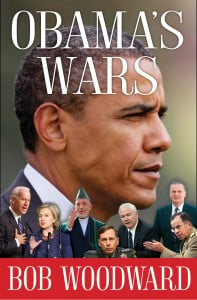
Shifting the Focus to Pakistan
“Obama’s Wars” released today already has the attentive public abuzz with tidbits of explosive revelations disclosing divergences at the top levels of government; nothing short of that we’ve come to expect from a Bob Woodward work. While McChrystal’s abrupt departure earlier this year had already exposed wrangling between our executive branch and military personnel, Woodward’s book is set to make public the reality of Obama’s campaign promise in setting Pakistan squarely at center stage in our War on Terror.
“we need to make clear to people that the cancer is in Pakistan”
The book will illustrate Obama’s aim to wind down the war; elucidating his always meticulous refrain from using “Victory” in reference to Afghanistan. Woodward reports however, that he is determined that no success can come without targeting Al Qaeda and the Afghan Taliban in Pakistan.
According to the Washington Post, the book recounts a top secret meeting with Obama’s then Director of national Intelligence, Mike McConnell who specifically warned that Pakistan is not be trusted as a partner in our Afghanistan engagement.
It’s thus no wonder “quagmire” is used to describe the task at hand. Because regardless of how much the President wants to cut back in Afghanistan, the very strong reluctance stems from potentially risking American interests and leaving the aforementioned “cancer” in Pakistan. So deepening, or as the President might prefer, “shifting” the focus requires a new, more Pakistan focused agenda.
Looking at his National Security Strategy laid out in May 2010, we do find Pakistan is a top concern. Amidst steadfast commitment to liberalist principles calling to defeat terrorism with multilateralism, in adherence with international law and a sensitive awareness to growing interdependence in an increasingly globalized system, the document reads our security objective as such:
“to disrupt, dismantle and defeat Al Qa’ida and its affiliates through a comprehensive strategy that denies them safe haven, strengthens front-line partners, secures our homeland, pursues justice through durable legal approaches, and counters a bankrupt agenda of extremist and murder with an agenda of hope and opportunity. The frontline of this fight is Afghanistan and Pakistan”
Naming Pakistan alongside Afghanistan underscores the President’s shifting focus. The policy refers to Pakistan as the “epicenter of violent extremism” and warns “danger from this region will only grow if it’s security slides backward”.
Throughout the document, we see such warnings used interchangeably for Afghanistan and Pakistan. Perhaps an indication of how policymakers and journalists use sweeping generalizations such as “Af-Pak” for two countries still far from understood. However the National Security Policy makes no mistake in interchanging recommendations. Clearly spelling out that “denying Al Qa-da the Ability to Threaten the American People, our Allies, Our partners and our Interests Overseas” is our main objective, it specifically spells out how to achieve this in Afghanistan through:
– Continued work with the United Nations and Afghan Government
– Improving accountable and affective governance
– Assistance on supporting the President of Afghanistan
– Supporting ministries, governors and local leaders who have demonstrated measured progress in combating corruption
– Targeting our aid to Agriculture and human rights
– Military and International Security Assistance Forces partnering with Afghanistan to target the insurgency
– Timetable laid out: transition to Afghan responsibility. July 2011 reducing troops.
This describes the first two parts of the three pronged approach spelled out in the National Security Strategy. The third prong refers to Pakistan and is relatively vague. It restates the objective of “strengthening Pakistan’s capacity to target violent extremists with continued assistance in those efforts” without laying out how this can occur. With Afghanistan, there is reference to the United Nations, specific levels of government and ISAF forces collaborating as a means to acheiving the objective to combat and provide security from violent extremists. No such specificities are spelled out in reference to Pakistan. Rather, the document vaguely describes an approach that is meant to
“strengthen Pakistan’s democracy…provide “assistance responsive to the needs of the Pakistani people and sustain a long term partnership committed to…deepening cooperation in a broad range of areas …in the years to come”
That is not a strategy. There is not a linking of means to an end. There is no specific timetable or reference to benchmarks for the end objective, nor quantifiable measurements for success. Further, Pakistan has not been able to cement it’s democracy let alone sufficiently respond to the needs of its population in 60+ years, making our intentions to do so implausible. In regards to “long term, deepening cooperation” amidst the staunch multilateral rhetoric, the document does not once refer to Pakistan as among the “partners” it seeks to engage in reaching our objectives. It references “fostering a relationship” but partnership is nowhere to be seen.
So, if the President has his way, we will wind down Afghanistan and likely shift focus to Pakistan. I hope by then there exists a more clearly laid out and practical approach to achieving our objectives and securing our interests there. Otherwise, without sufficient planning, the quagmire just deepens.